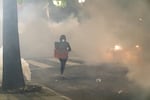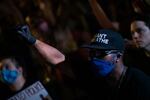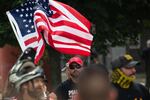A “campaign of widespread violence” by the Portland Police Bureau violated thousands of protesters’ constitutional rights during the city’s 2020 racial justice demonstrations, according to a motion filed Wednesday in federal court on behalf of protesters.
Specifically, the filing alleges the police and City of Portland consistently fired crowd control weapons such as tear gas, flash bang grenades and impact munitions indiscriminately into crowds, even when large numbers of people were not violating any laws.
“Advocating for police reform, defunding, and abolition, in support of the movement for Black Lives, is core protected speech,” the court filing states. “The campaign of violence by PPB would chill a person of ordinary firmness from continuing to engage in the protected activity.”
In addition to First Amendment free speech violations, the plaintiffs allege the city violated protesters’ Fourth Amendment rights against excessive use of force.
“The Portland Police Bureau engaged in the practice of using force against people who were simply refusing to leave the streets — or engage in what we call passive resistance. And that’s unlawful,” said Jesse Merrithew, one of the attorneys representing protesters.

Portland police used tear gas, flash bangs and rubber bullets to disperse a June 2020 protest, after some in the crowd threw water bottles and fruit at police and knocked down a fence surrounding the Multnomah County Justice Center.
Jonathan Levinson / OPB
The filing requests a judge to certify the lawsuit as a class action. If that’s granted, anyone subjected to officers’ use of force while passively resisting would be represented. The plaintiffs are seeking to change how Portland police respond to protests. The lawsuit does not seek monetary damages for the class.
Policy violations
Wednesday’s filing alleges the police bureau used tear gas nearly 300 times on 20 different days between May 29, 2020 and Sept. 5, 2020.
“In total, PPB engaged in over 6,000 uses of force over the duration of the protests,” the court filing states. “Yet the City found almost all uses of force were consistent with policy and training.”
That included two incidents that U.S. District Court Chief Judge Marco Hernandez found the city in contempt over, saying it violated a temporary restraining order he issued to limit officers’ use of tear gas to “situations in which the lives or safety of the public or the police are at risk.”
On June 2 alone the lawsuit claims police used more than 67 canisters of tear gas and did little to differentiate between people who were violent toward police and those passively resisting, based on use of force reports reviewed by attorneys for the plaintiffs, which include the local civil rights nonprofit Don’t Shoot Portland and five other named protesters. The lawsuit was first filed June 5, 2020.
The city declined to comment on the pending litigation, but will have the opportunity to respond in a court filing of its own in February. The Portland Police Bureau did not respond to requests for comment.
Officers’ inability or unwillingness to differentiate between violence or threats and lawful protest is part of a larger pattern resulting from poor training, oversight failures and unconstitutional directives, according to the filing.
“[Portland Police] did this to thousands of people who, like plaintiffs, were doing nothing more than standing in the street after being ordered to leave,” the motion states. “PPB’s unlawful conduct is a result of a multitude of failures within the bureau and the City, many of which were known to the City early on, and either intentionally ignored or glossed-over.”
About that confrontation on 6th. So much gas. pic.twitter.com/GcF6kK4ycO
— Dirk VanderHart (@dirquez) June 3, 2020
The motion alleges officers were trained how to justify force after the fact rather than avoid unconstitutional uses of force. In other instances, the protesters’ court filing alleges, the city trained officers based on case law higher courts had overturned.
In one allegedly unconstitutional use of force, an unnamed police officer described shoving a protester two to three times because she and two others were not moving fast enough — a legal protest tactic known as passive resistance.
In a separate incident, another unnamed officer appears to not understand the difference between passive and active resistance.
That officer wrote in their report that a protester “was not leaving the area with any urgency or purpose.”
“His wandering, as slow as he apparently could move, was an indication that he was trying to provoke an altercation with me and inhibit our objective of clearing the park. I took this to be active physical resistance against police,” the unnamed officer wrote in their report.
The protesters’ court filing notes each of the dozens of use of force incidents highlighted were approved by supervisors.
By the end of May 2020, barely two days into protests which saw the Multnomah County Justice Center set on fire, stores looted and multiple acts of vandalism throughout downtown, PPB recognized that use of force reports were piling up and making it difficult to catch errors and incomplete or problematic reports, according to the deposition of PPB Cpt. Robert Simon referenced in the filing.

Protesters gathered in front of the Multnomah County Justice Center and the federal courthouse on day 63 of protests against systemic racism and police violence. It was the first night in more than three weeks that federal officers were not present.
Jonathan Levinson / Jonathan Levinson
As the weeks wore on, the plaintiffs allege the city took no action to address the fact that many of the reported uses of force were clearly unconstitutional, according to the filing. Of 41 force reports reviewed, lawyers claim to have identified 12 incidents of pepper spray used on passive resisters, eight incidents of unjustified impact munitions fired at protesters, and 25 unjustified baton strikes or pushes. The filing is specific to Portland police and does not mention federal law enforcement officers who were deployed in June.
Wednesday’s filing echoes a February 2021 U.S. Department of Justice report by lawyers overseeing the 2014 use of force settlement agreement between the city and DOJ. The Justice Department’s report found that Portland officers regularly violated the bureau’s use of force directives during the summer of 2020.
“PPB members used force, some beyond policy,” the DOJ stated. “Supervisors approved that force, some without required critical assessment.”
Justice Department lawyers said the incomplete force reports and lack of supervisor assessments meant the accountability system would be hamstrung.
Training materials
On Friday, Portland Mayor Ted Wheeler’s office sent a press release notifying the public that a 2018 presentation given to new members of Portland police’s now-disbanded Rapid Response Team concluded with a slide celebrating and encouraging violence against “dirty hippies.”
“And so I shall send among you, my humble servants with hat and with bat; that they may christen your heads with hickory, and anoint your face with pepper spray,” the slide reads, over a picture of what appears to be a riot gear-clad police officer beating a protester.

A 2018 Rapid Response Team training slide encourages violence against "dirty hippies."
Courtesy: City of Portland
The slide, which was first uncovered in September, “strongly suggests that the campaign of police violence that began on May 29, 2020 was motivated by the goal of silencing advocates for police reform, defunding, and abolition,” according to Wednesday’s court filing.
In a statement released Friday along with the slide, Wheeler and Portland Police Chief Chuck Lovell condemned the message, and said an internal affairs investigation is ongoing.
“I am disgusted that this offensive content was added to a training presentation for our police officers,” Wheeler said in a statement.
According to a deposition given Sept. 23 by former RRT commander Lt. Franz Schoening, the presentation was also shown to Salem police officers, Oregon State Police troopers and Multnomah County sheriff’s deputies.
A separate PPB training slide from 2019 erroneously told officers a federal court ruled it was lawful to use pepper spray against passively resisting anti-logging protesters. The Ninth Circuit court of appeals had overturned that ruling — something Schoening said he only learned the day before he was deposed.
Federal prosecutors overseeing Portland’s settlement agreement were made aware of the offensive material last Friday, soon before it was sent to the media, according to a blistering letter the prosecutors sent to Lovell and City Attorney Robert Taylor.
Prosecutors Jonas Geissler and Jared Hager wrote the 2018 RRT training slides “have varying degrees of offensive content, incorrect guidance, and false or misleading information related to PPB’s crowd management policies and practices.”
Had the city provided the training materials to the Justice Department when they were developed, as required by the settlement agreement, the DOJ would not have approved the training and would have provided “substantial edits.”
“The existence of these RRT training materials might have materially impacted our assessments of the City’s compliance with the Agreement,” the letter states.
Lovell said the message in the slide is not representative of the police bureau.
The motion filed Wednesday, however, paints a different picture.
History of political bias
The filing cites a dozen examples from the past decade of the police bureau treating anti-police and anti-war protests more harshly than far-right protests. They include 2017 anti-Trump demonstrations when police used tear gas and less lethal munitions against demonstrators and journalists.
“Throughout this time, the Proud Boys’ open threats and calls for violence at their demonstrations continued unabated,” the lawsuit reads. “[Patriot Prayer’s Joey] Gibson also continued to advocate for the assault of antifascist demonstrators and opined that Portland’s ‘streets need to be cleaned up.’”
Those open calls for violence didn’t lead PPB to treat the far-right groups as a threat, the lawsuit alleges.

Joey Gibson, leader of Vancouver-based Patriot Prayer, a group that attracts white supremacists and has engaged in violence, waves an American flag at a white supremacist rally in Portland, Ore., Saturday, Aug. 17, 2019. The rally organized by the Proud Boys, labeled a hate group by the Southern Poverty Law Center, attracted militia members, white supremacists and neo-Nazis and carried the potential for violence.
Bradley W. Parks / OPB
The city’s track record of harsh policing against anti-war and anti-police demonstrators dates back to well before events of the past five years.
The lawsuit draws on historical examples of the city’s apparent sympathies for far-right viewpoints, including recently retired police Capt. Mark Kruger, who built a memorial to Nazi soldiers in Rocky Butte Park. The filing also cites an incident in 1936, when officers arrested anti-fascist protesters who planned to demonstrate against a visiting German navy warship.
According to an Oregon Historical Society article, the warship was welcomed by Portlanders jubilantly exchanging “heil Hitler” salutes with the swastika clad warship Kreuzer Emden.
“The night before the Emden arrived in Portland, the local chapter of the American League Against War and Fascism held a well-attended meeting to plan a protest against the ship’s mooring,” the article reads. “An actual protest materialized, but police arrested the organizers, apparently for failing to obtain a license for their gathering. They remained in jail for the duration of the Emden’s stay.”
In addition to the five named plaintiffs, Wednesday’s 83-page motion pulls from more than 150 witness declarations that describe dozens of violent police encounters including, “peacefully chanting by the fence erected outside the courthouse when the police started gassing the protesters and shooting them with rubber bullets,” being shot while attending to an injured person, and being “trapped in tear gas” as police threw more tear gas in the direction protesters were told to disperse.
It will now be up to Hernandez, the federal judge overseeing the case, to determine if the lawsuit should be certified as a class action. That decision is expected by the summer.



